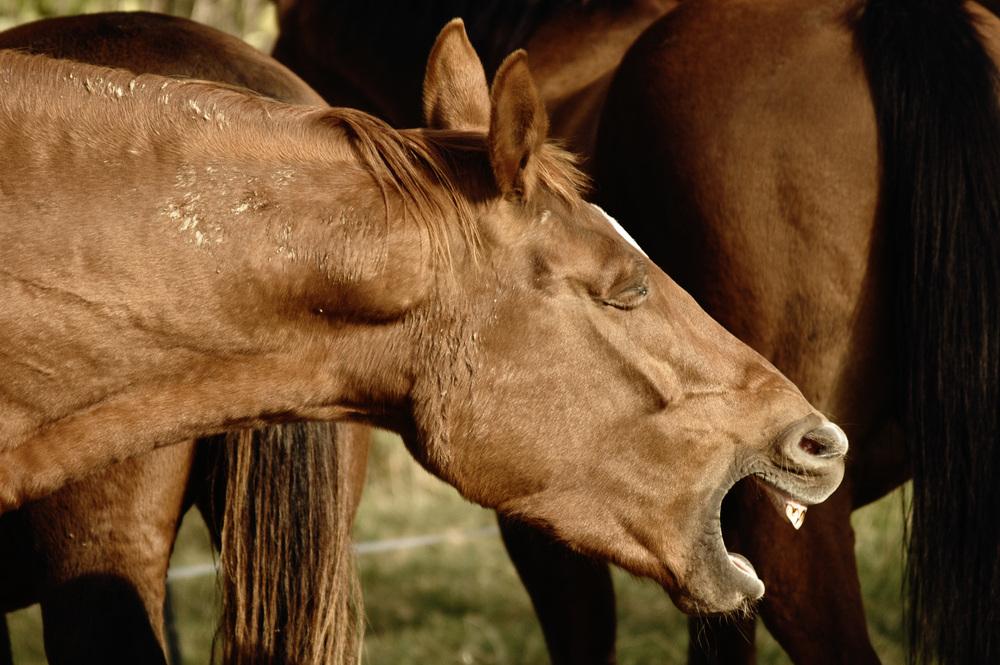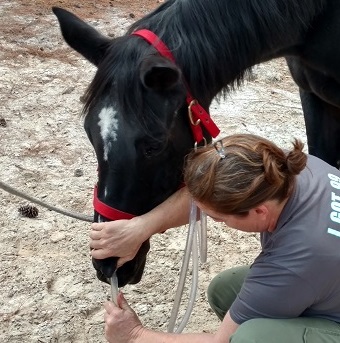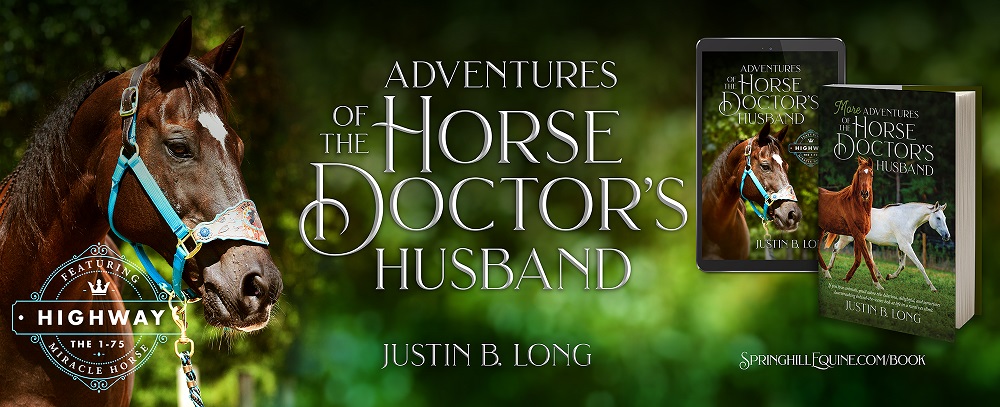Tuesdays with Tony
You’re walking through the barn doing one last check of all the horses after their evening feed when you notice one horse has stepped away from his feed bucket. You inspect the feed and notice that some has been consumed but the majority is remaining. Upon further observation you realize your horse is holding his head down with his neck stretched out and making the occasional gag-like sound. Then you see it – feed and saliva coming out of your horse’s nose! What’s going on? Sit back, relax, and let this cat explain it all…. most likely you are dealing with a “choke”.
What is a choke?
Unlike in people (and cats, which are superior in all ways), choke in horses refers to something that is obstructing the esophagus instead of blocking the horse’s airway. Choke is most commonly caused by swallowing feed material that is too dry or course, or that isn’t properly chewed. The feed gets stuck in the esophagus instead of traveling into the stomach. Don’t worry, they can still breathe just fine.
What are the signs of choke?
I am a stickler for good hygiene, so of course, I always have my coat groomed to perfection. Unfortunately, this makes me prone to hairballs. If you’ve ever seen a cat hack up a hairball, it’s not a pretty sight, believe you me. Well, much like the retching sound cats make when hacking up a hairball, if your horse is choking you may notice that he makes a gagging, hacking, coughing sound. He may have suddenly backed away from his feed while appearing anxious or nervous. You may even start to notice salvia and feed material coming from your horse’s mouth and nostrils. Sometimes horses will extend their neck and hold their head low. The drama queen types may even throw themselves down on the ground. If the choke has gone unnoticed for a while, the horse can become dehydrated and depressed. The signs of choke can be quite alarming but keep calm and call the Springhill office so my docs can walk you through what to do next.

What causes choke?
I see no problem with inhaling my food as fast as I possibly can. In fact, if I eat mine fast enough, I can sometimes get seconds because my minions think they forgot to feed me! For horses though, eating too quickly, or bolting their feed, is the primary cause of choke. Horses need to chew and moisten their feed thoroughly before swallowing. If they don’t, it may cause them to choke. Choke can be caused by hay or straw, grain, treats like carrots and apples, or non-food objects. Some things, such as corn on the cob, must never be fed as treats due to the risk of obstruction they present. Certain feed materials such as alfalfa cubes or beet pulp must be pre-moistened with water prior to feeding. If they are fed dry, your horse may be predisposed to choke. I recommend soaking alfalfa cubes and beet pulp in a bucket of water for at least 20 minutes prior to feeding. Your horse will get more water and be less prone to choke, another win-win.
Dental problems can also cause a horse to choke if he can’t chew his food as well as he should. If he has sharp points on his teeth or other abnormalities, he won’t be able to chew easily, and may try to swallow his food before it is adequately ground up and moistened. This is even more likely with older horses who may be missing teeth. Reason number 1 million to get your horse’s teeth floated once a year.
Occasionally, horses may have a condition that predispose them to choke, such as diverticulum and stricture. A diverticulum is a deviation of the esophagus that forms a pouch or sac in which feed material can become trapped, resulting in a choke. Strictures are basically a scar within the esophagus and can be caused by prior choke episodes that have caused damage to the lining of the esophagus. Strictures do not allow the esophagus to expand and contract normally and therefore may cause feed material to get stuck.
Why is choking a problem?
While many chokes will resolve on their own, or with a little assistance from my docs, chokes can be very serious and lead to complications including dehydration and aspiration pneumonia. Since a horse can’t swallow when he is choked, the food material can backflow into the airway and into the lungs, causing a bacterial infection. The longer a horse is choked, the more likely these complications will arise. So, what does that mean? It means, if you suspect that your horse is choked or may have choked recently, call my docs immediately to talk about what needs to happen.
How is choke treated?
The first thing my docs will tell you when you call is to remove your horse from any feed and water. If you are sure that the choke just started, my docs may have you keep an eye on your horse for about 30 minutes, since many chokes will resolve by themselves. But if it’s already been going on for a while, they’ll want to intervene to get it cleared. Most of the time, this can be done on your farm.

Upon arrival, my docs will perform a physical exam on your horse, check his heart rate, respiratory rate, temperature, and listen for guts sounds. They will determine if your horse is still choked and then decide how to proceed. Next, they will likely administer a little sedative and smooth muscle relaxer to help decrease the contractions of the esophagus. We have all seen a tube passed for a colic, right? Well, you’ll also see my docs pull out the tube if your horse is choked. The nasogastric tube will be passed up your horse’s nose and into his esophagus. This allows my doc to locate the blockage as well as flush out the obstruction with water.
Sometimes if the obstruction is a stubborn one, you may see my docs doing something kind of wild – pouring Coca Cola down the tube to get it to break apart! And you know what? It works! One of my docs even published a paper on it!
Now I hope I don’t even have to mention this, but under no circumstances should you stick a hose up your horse’s nose or throat yourself. Or try to make him drink water or cola! Remember, my docs are highly trained professionals, and these procedures should only be performed by licensed veterinarians. There is a very specific technique to getting the tube into the esophagus and not into the lungs and doing it wrong could injure or kill your horse. But I know you would never try something silly like that.
What is the aftercare for choke?
Fortunately, most of the time, chokes are easily resolved, and aftercare is minimal. You might need to withhold certain foods for several days. You should monitor your horse’s temperature for a few days after a choke, since a fever can be a sign of pneumonia, and keep an eye out for coughing, nasal discharge, or fast breathing.
If your horse has been choked for several hours or the choke was difficult to resolve, my docs will likely put your horse on a course of antibiotics to help combat the development of aspiration pneumonia. If your horse seems dehydrated or has signs of infection, the docs may recommend he come to the clinic for intravenous fluids, antibiotics, and careful monitoring.
To avoid future chokes, my docs may recommend that you feed your horse grain or hay that has been wetted down before feeding and advise you on strategies to slow down his eating. Some people put large smooth rocks in their horse’s feed bucket to make it harder for him to grab big mouthfuls. And remember to schedule that dental exam since tooth problems are a common cause. When in doubt, give my docs a call!
Until next week,
~ Tony
P.S. This is the written form of my wisdom. I also have a podcast and a video library. Well, my humans do that stuff, but it’s still mine. Anyway, if you want to watch videos, click here. If you want to listen to interesting conversations about horse things, click here. And if you want to keep reading my amazing cat blog, just scroll down a bit. See, I’ve got you covered!
Tuesdays with Tony is the official blog of Tony the Clinic Cat at Springhill Equine Veterinary Clinic in Newberry, Florida. If you liked this blog, please subscribe below, and share it with your friends on social media! For more information, please call us at (352) 472-1620, visit our website at SpringhillEquine.com, or follow us on Facebook!
[jetpack_subscription_form title="Subscribe to Whinny's Wisdoms"]

